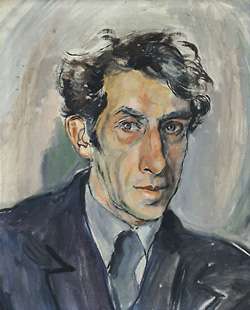Bruno Barilli
Bruno Barilli (14 December 1880 – 15 April 1952) was an Italian actor and music composer, and best remembered for his writings on music and music composition.

Biography
He was born in Fano in the region of Marche, Italy, but studied musical composition at the Arrigo Boito Conservatory at Parma. From there, he gained the position directing the orchestra at the Dirigentschule in Munich. There he married Danica Pavlović, descendant of the Karađorđević dynasty and cousin of the King Petar I of Serbia. Together they had one daughter, Milena Pavlović-Barili, who became a prominent Serbian painter.
Returning to Italy in 1910, Barilli composed the opera Medusa with libretto by O. Schanzer. In 1914, the opera was awarded at the MacCormick competition. Barilli wrote the music and libretto for the opera Emiral (1915), awarded a prize in a Roman competition judged by Giacomo Puccini. As an actor, he is known for performance in La Rosa (1921).
But Barilli is known mainly for his prolific writing and editing as a music critic for numerous journals including La Concordia(1915–16); Il Tempo (1917–22);Corriere italiano (1923–24); Il Tevere (1925-33); Gazzetta del Popolo; Risorgimento liberale; L' Unità, and others. His essays, both on music and travel, have been published in collected form in books titled Delirama (1924);[1] Il sorcio nel violino (1926); Il paese del melodramma (1931); Lo spettatore stralunato: cronache cinematografiche; Il sole in trappola: diario del periplo dell'Africa (1931); Il paese del melodramma; and Capricci di vegliardo among others.
During the early decades of the twentieth century, he was living in the Villa Strohl Fern, and active in the Roman artistic circles that habitually met at the Caffè Aragno on Via del Corso, a café known as the rendezvous of the city's literary and artistic elite. Here he met with friends Emilio Cecchi, Antonio Baldini, and Vincenzo Cardarelli, but also encountered Ungaretti, Carlo Socrate]], Soffici, Pasqualina Spadini, Mario Broglio, Armando Ferri, Quirino Ruggeri, Roberto Longhi, Riccardo Francalancia, and Aurelio Saffi. Barilli's portrait was painted in 1928 by Massimo Campigli.[2]
In 1925 he signed on to the Manifesto of the Fascist Intellectuals, written by Giovanni Gentile. Barilli seems to have ultimately soured on his support for fascism. From 1939 al 1941, he collaborated in the weekly Oggi, whose editor was Arrigo Benedetti till the journal was suppressed by the authorities.
His brother Arnaldo was a local art historian, and the brother Latino a painter. Bruno was the uncle of the actor of Cecrope Barilli, great-uncle of actress Carlotta Barilli, actor and film director Francesco Barilli, and costume designer Evelina Barilli.[3]
He died on April 15, 1952 in Rome.[4]
References
- Delirama, 1948 edition.
- Review on exhibit Bruno Barilli, writer, artist, and tight-rope walker at Biblioteca Nazionale Centrale of Rome], article in Corriere della Sera by Edoardo Sassi.
- IMDB database, entry on Barilli.
- Enciclopedia Treccani, Dizionario Biografico degli Italiani, Volume 6 (1964), entry on Bruno Barilli by Arnaldo Bocelli.